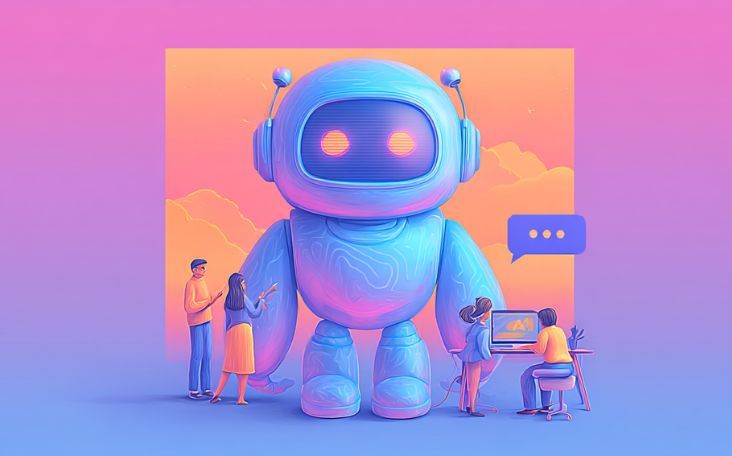Discover how AI agents transform business and customer interaction with real-time automation, personalization, and enterprise-ready workflows.

Akshat Mandloi
Updated on
December 26, 2025 at 11:28 AM
Enterprises today are under pressure to do two things at once: deliver seamless, personalized customer experiences while streamlining operations behind the scenes. Traditional automation and legacy chatbots have helped with efficiency, but they often fall short of truly dynamic, human-like interaction.
This is where AI agents come into play. Far more advanced than scripted bots, AI agents are designed to understand context, make decisions, and take action across business workflows and customer touchpoints. They’re not just answering questions—they’re transforming how companies operate and how customers engage with brands.
In this blog, we’ll explore how AI agents reshape customer interactions and business processes, the benefits they unlock, the challenges enterprises must navigate, and what the future of AI-driven engagement looks like.
Key Takeaways
AI agents are reshaping business and customer interaction by moving beyond scripted bots to autonomous, goal-driven systems.
They enable real-time, personalized engagement in customer support, sales, operations, and decision-making.
Benefits include efficiency, cost savings, consistency, and scalability, plus richer insights from every interaction.
Enterprises must address challenges like data privacy, integration, and human oversight to succeed with AI agents.
The future lies in generative + agentic convergence, real-time orchestration, and industry-specific adoption.
What Are AI Agents (and How They Differ from Chatbots)?
At their core, AI agents are autonomous systems capable of reasoning, adapting, and acting toward specific goals. Unlike traditional chatbots or rule-based scripts that only respond within narrow limits, AI agents are designed to:
Understand natural language and context — going beyond keywords to grasp intent.
Plan and execute multi-step workflows — such as handling a support ticket from intake to resolution.
Adapt based on feedback and outcomes — learning from each interaction to improve over time.
Integrate with enterprise systems — updating CRMs, ERPs, or other platforms without human intervention.
This makes them fundamentally different from chatbots. While a chatbot might respond to “reset my password” with a fixed script, an AI agent could:
Verify user identity.
Reset the password through the enterprise’s authentication system.
Notify the user via multiple channels.
Log the interaction in the company’s CRM—without human assistance.
In other words, AI agents don’t just converse—they take action, making them a critical enabler of modern business transformation.
Why AI Agents Matter for Modern Enterprises
Customer expectations have never been higher. People want real-time responses, personalized service, and seamless experiences across every channel. At the same time, enterprises face growing pressure to operate efficiently, manage complex workflows, and scale globally without increasing costs linearly.
Traditional tools—like static chatbots or siloed automation scripts—can’t keep up with this level of demand. They’re limited to predefined scenarios and often frustrate customers instead of helping them.
AI agents fill this gap. Unlike legacy solutions, they can:
Deliver 24/7 customer interaction without adding headcount.
Adapt in real time to changing inputs, whether it’s a frustrated customer, a shift in demand, or a system update.
Scale effortlessly across regions and languages.
Bridge business silos by integrating with multiple enterprise systems at once.
According to Gartner, by 2026 more than 80% of customer interactions will be handled by AI agents rather than humans—up from just 20% in 2022. This shift underscores why enterprises that embrace agentic systems now will be better prepared to meet future demands.
AI agents aren’t just a technology upgrade; they’re becoming a strategic necessity for enterprises that want to stay competitive in both customer experience and operational performance.
Key Ways AI Agents Transform Business and Customer Interaction
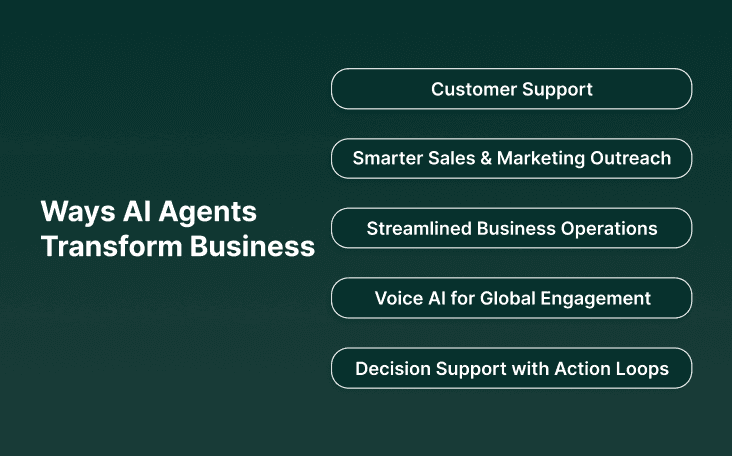
1. Customer Support That Actually Resolves Issues
AI agents move beyond scripted responses to deliver natural, real-time conversations. They can verify identities, troubleshoot issues, escalate when necessary, and log outcomes in enterprise systems. This means faster resolutions and less frustration for customers.
Related read: Real-Time TTS Conversion Using AI.
2. Smarter Sales and Marketing Outreach
Instead of relying solely on human teams, AI agents can qualify leads, personalize outreach, and even schedule calls. They act as digital sales assistants—freeing sales reps to focus on closing deals while ensuring no opportunity slips through the cracks.
3. Streamlined Business Operations
Behind the scenes, AI agents are transforming how enterprises handle repetitive workflows like IT ticket triage, order processing, and report generation. By integrating directly with CRMs, ERPs, and knowledge bases, they reduce cycle times and minimize human error.
Insights: What We Learned From Benchmarking Real-Time AI Agents.
4. Voice AI for Global Engagement
Many enterprises serve multilingual, geographically diverse audiences. With advanced voice AI, agents can converse naturally across languages and dialects, providing localized support without scaling headcount.
Explore: Evaluating the Lightning-v2 Multilingual TTS Model.
5. Decision Support Through Autonomous Action Loops
AI agents aren’t just reactive—they can analyze data, simulate scenarios, and act on insights. For example, in retail, an AI agent might detect a sudden demand spike, adjust supply chain workflows, and notify managers in real time. This turns data into immediate business action.
Benefits of AI Agents for Enterprises
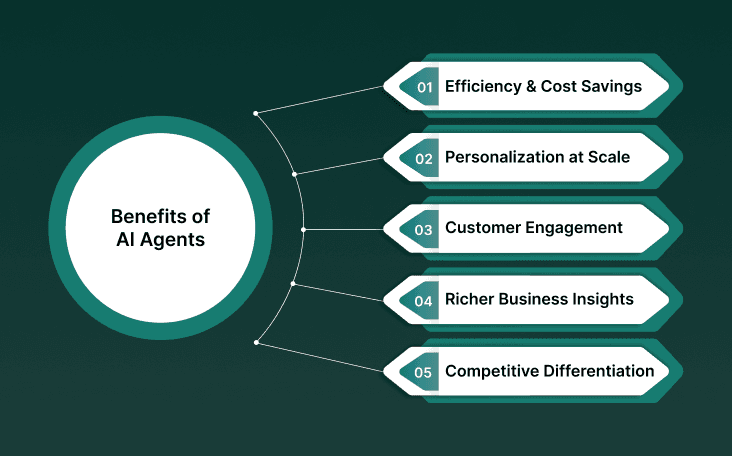
For enterprises, the value of AI agents lies not just in automation, but in their ability to create measurable, scalable impact across both operations and customer experience.
1. Efficiency and Cost Savings
By automating multi-step workflows, AI agents reduce reliance on manual processes. What once took minutes or hours can be handled instantly, cutting operational costs and allowing teams to focus on higher-value work.
2. Consistency and Personalization at Scale
Unlike human agents who may vary in tone or accuracy, AI agents deliver consistent responses while adapting to individual customer needs. This creates personalized experiences without sacrificing quality or compliance.
3. Always-On Customer Engagement
AI agents provide 24/7 availability across time zones and languages. Customers no longer need to wait for business hours or endure long hold times—improving satisfaction and loyalty.
Learn more about what makes this possible: What Makes a Real-Time Agent Truly Real-Time.
4. Richer Business Insights
Every interaction handled by an AI agent becomes a source of structured data. This data can be analyzed to uncover customer pain points, improve workflows, and guide strategic decisions—insights that often go untapped in human-only interactions.
5. Competitive Differentiation
Enterprises that adopt AI agents early gain a clear advantage: faster service, better customer experiences, and more efficient operations. These become key differentiators in markets where customer expectations continue to rise.
Key Challenges Enterprises Face When Adopting AI Agents
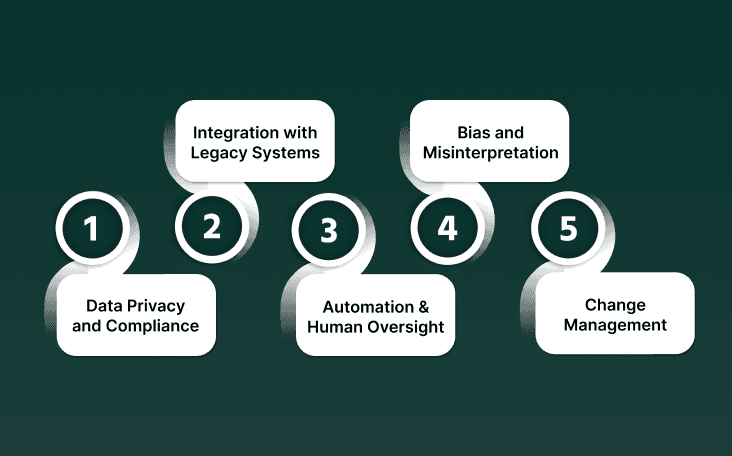
While AI agents bring powerful advantages, deploying them at enterprise scale isn’t without challenges. Organizations need to manage these carefully to unlock long-term value.
1. Data Privacy and Compliance
AI agents often handle sensitive data—from personal customer details to financial records. Ensuring compliance with regulations like GDPR, HIPAA, or PCI DSS is critical. Enterprises must adopt solutions that prioritize data encryption, secure storage, and audit trails to maintain trust.
2. Integration with Legacy Systems
Enterprises rarely run on a single, modern platform. Integrating AI agents with existing CRMs, ERPs, and telephony systems can be complex, requiring APIs, middleware, and phased rollouts. Poor integration reduces efficiency and slows adoption.
3. Balancing Automation and Human Oversight
Not every situation should be fully automated. Escalations for sensitive or complex cases—like financial disputes or healthcare concerns—still need human empathy. Striking the right balance between autonomous resolution and human intervention is essential.
4. Bias and Misinterpretation
AI models trained on limited or skewed data can misinterpret intent or provide biased responses. Regular audits, retraining, and transparency are required to ensure fairness and reliability.
5. Change Management and Adoption
Employees may worry about AI replacing their roles, while customers may be skeptical of interacting with “robots.” Clear communication, training, and demonstrating how AI agents augment rather than replace human work are key to adoption.
The Future of AI Agents in Business and Customer Interaction
AI agents are still in the early stages of enterprise adoption, but their trajectory is clear: they’re moving from supporting roles to becoming a strategic layer in how businesses operate and engage with customers.
1. Convergence of Generative and Agentic AI
Generative AI enables content creation, while agentic AI adds reasoning and decision-making. Together, they create agents that can both generate responses and take meaningful action. This combination will redefine customer service, sales, and knowledge work.
2. Real-Time Orchestration as a Differentiator
Latency determines whether a conversation feels human or robotic. Enterprises will prioritize sub-100ms, real-time infrastructure, ensuring interactions flow as smoothly as human dialogue. This will be a key competitive advantage in industries like finance, healthcare, and retail.
3. Industry-Specific Applications
AI agents will evolve from generic assistants into specialized experts:
Healthcare: patient intake, follow-up reminders, compliance documentation.
Insurance: claims intake, fraud detection, multilingual customer support.
E-commerce: order status, returns, personalized product recommendations.
4. Ethical and Regulatory Standards
Governments and industry bodies are moving quickly to define AI governance. Enterprises that embrace explainability, fairness, and transparency early will reduce compliance risk and build greater customer trust.
5. Embedded AI Agents in Collaboration Tools
In hybrid workplaces, AI agents will integrate directly into platforms like Teams, Slack, and Zoom—taking notes, assigning tasks, and summarizing discussions in real time. These embedded roles will make agents indispensable to knowledge workers.
In short, the enterprises that start investing in AI agents today will be the ones shaping how business and customer interaction looks tomorrow.
How Smallest.ai Delivers Enterprise-Ready AI Agents
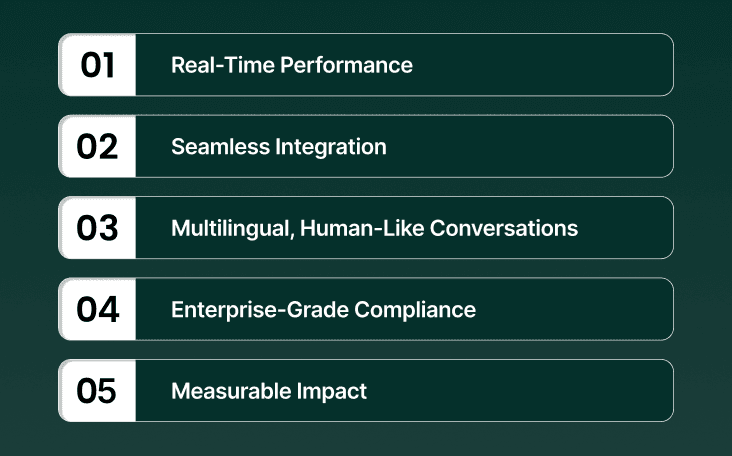
Adopting AI agents at scale requires more than just algorithms—it demands real-time infrastructure, seamless integration, and enterprise-grade compliance. That’s where Smallest.ai enables enterprises to move from pilot projects to production-ready AI agents.
1. Real-Time Performance
Smallest delivers sub-100ms response times, ensuring conversations feel natural and human-like. This low latency is critical for customer-facing interactions where delays can break trust.
2. Seamless Integration
With robust APIs and SDKs, Smallest AI agents plug directly into CRMs, ERPs, telephony, and collaboration platforms. Enterprises can roll out AI agents without costly system overhauls or downtime.
3. Multilingual, Human-Like Conversations
Powered by Lightning-v2 multilingual TTS, Smallest enables AI agents to serve global audiences in multiple languages and dialects—delivering personalized, localized engagement at scale.
4. Enterprise-Grade Compliance
From finance to healthcare, data security is non-negotiable. Smallest supports on-premises and VPC deployments, aligned with SOC 2, HIPAA, GDPR, and PCI standards—so enterprises can adopt AI agents without compromising compliance.
Measurable Impact
With Smallest, enterprises can:
Reduce support costs by automating high-volume inquiries.
Improve customer satisfaction with natural, instant responses.
Scale globally while maintaining compliance and reliability.
Ready to see how AI agents can transform your enterprise workflows and customer interactions? Explore Smallest.ai Enterprise Solutions today.
FAQs on AI Agents in Business and Customer Interaction
1. What are AI agents in business?
AI agents are autonomous systems that understand context, make decisions, and take action across workflows—going beyond traditional chatbots or automation scripts.
2. How do AI agents improve customer interaction?
They provide real-time, natural conversations, resolve issues end-to-end, and personalize experiences—leading to faster service and higher satisfaction.
3. What’s the difference between chatbots and AI agents?
Chatbots follow predefined scripts. AI agents can reason, adapt, and act across systems, handling multi-step tasks without human intervention.
4. What are the business benefits of AI agents?
Key benefits include reduced operational costs, consistent service, scalable 24/7 engagement, and actionable insights from interaction data.
5. What challenges should enterprises expect with AI agents?
Enterprises must manage data privacy, system integration, oversight, and change management to successfully deploy AI agents.
6. What’s the future of AI agents in business?
Expect convergence with generative AI, industry-specific applications, real-time orchestration, and embedded agents in collaboration tools.

